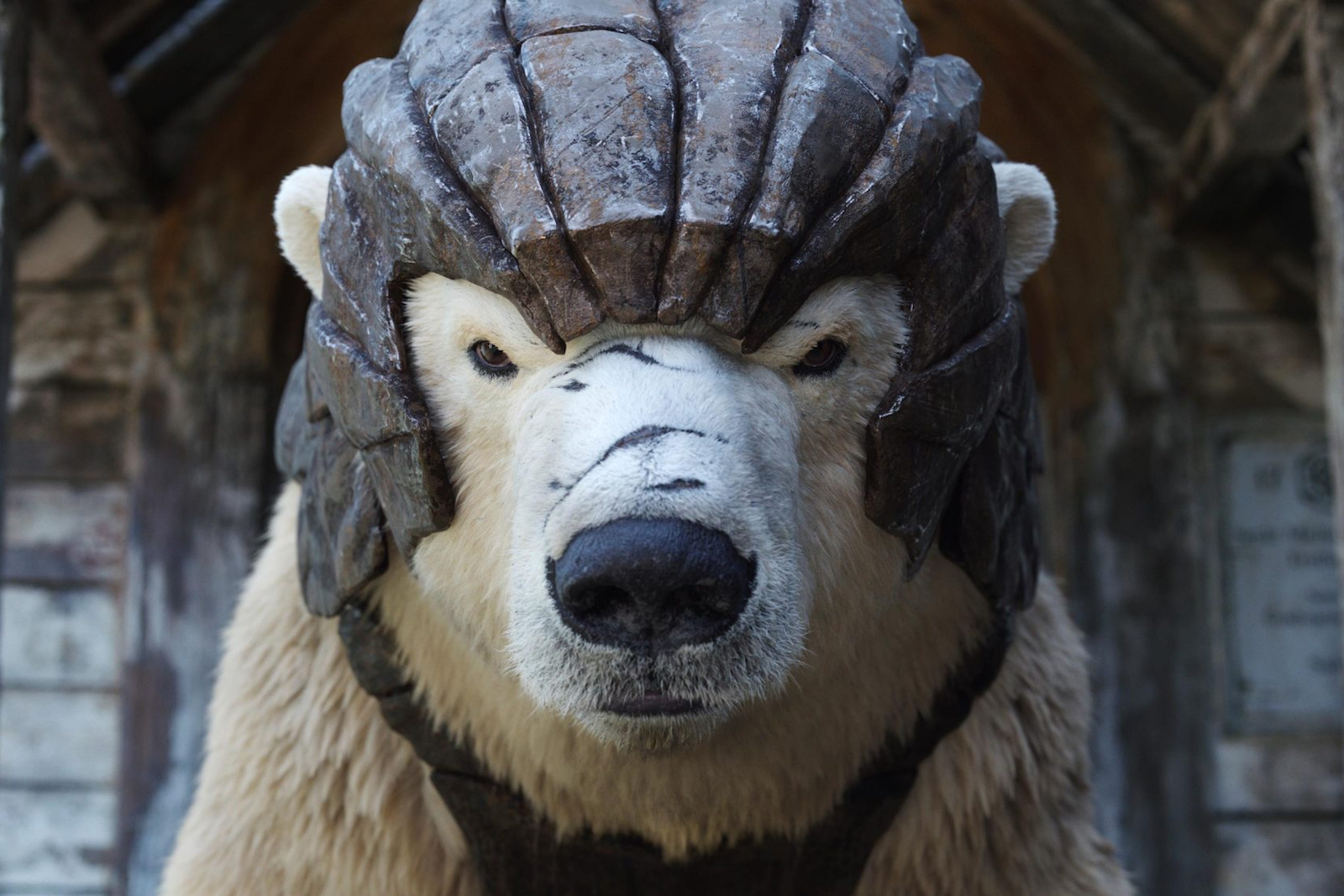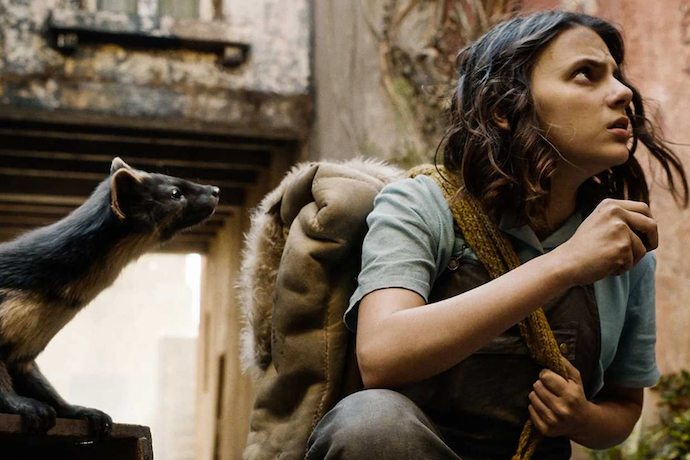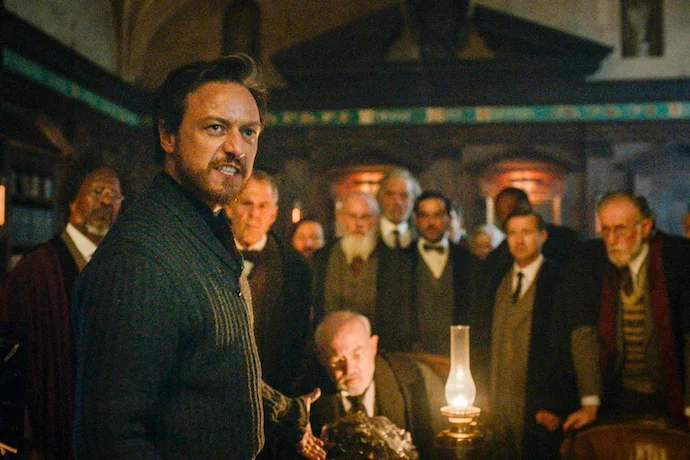
‘His Dark Materials’ and the Perils of Adaptation
There were few other book series that enthralled me growing up as much as Philip Pullman’s His Dark Materials trilogy. While a certain boy at a wizarding school soaked up much of the attention at the time, His Dark Materials distinguished itself with a riveting storyline, rich and vibrant world-building, and relatable characters. The series was also controversial due to its seemingly anti-Catholic messaging.
The Chronicles of Narnia inspired Philip Pullman to write a much more secular and subversive series of books. The series focuses on Lyra, a young girl who lives in a different parallel universe with some key differences from our own. One of the most obvious is that in Lyra’s world, a person’s soul lives outside of their body in an animal form called a dæmon. Dæmons can talk, and the form they take is usually indicative of a person’s character and personality.
The Golden Compass, the first book in the series, follows Lyra, a seemingly orphaned wild child who loves gallivanting around the buildings and structures of Oxford, as she is reunited with her mother, series antagonist Mrs. Coulter. Lyra has been given an alethiometer, the titular “golden compass” that can seemingly answer any question she could have.
As she escapes Mrs. Coulter, Lyra’s adventures take her on a boat with the nomadic seafaring Gyptian people, and proceeds to make new friends and allies, including an aeronaut from Texas named Lee Scoresby, a talking polar bear king named Iorek Byrnison, and Serafina Pekkala, the queen of a powerful clan of witches. Ultimately, Lyra stumbles onto a plot where her mother has been severing the connection between children and their dæmons. Lyra and her best friend from Oxford, Roger, attempt to escape. They stumble upon Lord Asriel, revealed to be Lyra’s father, who then uses the energy from severing Roger from his dæmon to open a portal to another world, killing Roger in the process.

The subsequent installment, The Subtle Knife, opens not by immediately resolving that tension but rather by introducing us to Will Parry. Will is from our universe, but strange coinciding events have him escaping an unintentional murder through a hole he notices between this world and another. There, he encounters Lyra, and though both are initially defensive around each other, eventually they form a strong bond. Lyra traverses our universe’s Oxford to get more information on “dust,” a substance that powers her alethiometer and seems strongly connected to human beings. Lyra meets a scientist named Mary Malone, who comes to realize how much her work overlaps with what Lyra is telling her.
Will eventually becomes the knife-bearer sworn to wield the titular subtle knife, a knife so sharp it can cut boundaries between the different worlds. While I enjoyed The Golden Compass well enough, with its male teenage protagonist with “chosen one” status whom I happened to share a first name with, my love of the series went into overdrive. The book ends on a similar cliffhanger: Will is finally reunited with his father, who dies shortly thereafter, and Lyra has gone missing.
The pinnacle of the trilogy was its final installment, The Amber Spyglass. Will attempts to rescue Lyra from a sleeping spell placed on her by Mrs. Coulter. Once reawakened, Lyra pleads for Will to open a portal to the Land of the Dead to make amends with the soul of her dead friend Roger. After Iorek Byrnison repairs the knife, Will and Lyra make their way into this terrible purgatory, where Lyra is forced to tearfully separate from her dæmon Pantalaimon. Soon enough, they encounter an infinite parade of the souls of the dead haunted by terrifying harpies but are united with deceased loved ones like Roger, Lee Scoresby, and Will’s father. Will eventually cuts a portal that releases the souls and gives them a sense of lasting peace.
Meanwhile, Mary Malone has found another portal, this one leading to one of the series’ most beloved inventions: the mulefa, sentient elephant-like creatures who get around with wheels they wear on their legs that they obtain from massive seedpods. The mulefa and Mary contemplate the mysteries of Dust as they learn to communicate with one another.
Lyra’s parents are working to wage war against Metatron, their universe’s equivalent of God, eventually winning this battle at the cost of their lives, dragging him down into an eternal abyss. With order having been restored to the many worlds, Lyra and Will discover their true feelings for each other and fall in love. However, being advised that one cannot stay long in a world that isn’t their own without succumbing to illness and eventually dying, they make the emotional decision to go home to their respective universes. They promise each other undying love and to return to the same spot at Oxford in their respective universes on the same day every year.
Over the past couple of years, I’ve reread both The Subtle Knife and The Amber Spyglass and found both to be rewarding returns. There is an underlying maturity to the books that even Harry Potter doesn’t seem to have, invoking everything from John Milton’s Paradise Lost to the existentialist nature of “dust.”
Adapting such rich texts for any medium was never going to be easy. If one is deliberate and makes smart choices, you can turn a beloved young adult book into a moneymaking franchise, such as what happened with Harry Potter and The Hunger Games. Every once in a while, a filmmaker with the passion can translate even the heaviest fantasy texts and make them accessible to a wide audience, such is the case with Peter Jackson and The Lord of the Rings, or more recently, Denis Villeneuve and Dune. Yet, the 21st century thus far has been littered with the forgotten failures of movie adaptations of books that were once cited to be the next big thing, from Eragon (2007) to The Mortal Instruments: City of Bones (2013).
The Golden Compass was adapted as a major motion picture meant to ride the coattails of the success of the then-ongoing Harry Potter franchise. The movie, released in 2007, is impeccably cast, including and especially with Nicole Kidman as Mrs. Coulter and 007 himself, Daniel Craig, as Lord Asriel. The film was a disappointment at the box office, gained middling reviews, and the only real vindication it received was a surprisingly well-deserved Oscar for Visual Effects. Plans to adapt the other two books in the trilogy were subsequently scrapped.
I think the movie adaptation is a serviceable one. Controversially, the movie ends before the book does, depriving the audience of witnessing the book’s captivating cliffhanger ending, which I think is a major hindrance. In addition to Kidman and Craig, the casting of Dakota Blue Richards as Lyra, as well as supporting turns from the likes of Sam Elliott as Lee Scoresby, Eva Green as Pekkala, and Ian McKellan as the voice of Iorek Byrnison, all feel inspired. But it doesn’t quite catch the magic of the book, despite the mostly noble attempt to. It felt very much like it was trying to fit a mold it wasn’t made for, another attempt by yet another studio to chase the Harry Potter-esque cash cow without really understanding what made it uniquely stand out.

Which brings me to HBO’s recently-concluded adaptation of the trilogy that began airing in 2019. The show ran for three seasons and was a co-production between HBO and the BBC. The vast majority of episodes were either written or co-written by Jack Thorne, best known for writing the two Enola Holmes movies and the stage play Harry Potter and the Cursed Child. It stars Dafne Keen, best known as Wolverine’s daughter in Logan, as Lyra. Her parents, Mrs. Coulter, played by Ruth Wilson, and Lord Asriel, played by James McAvoy, feel much more central to this adaptation even as their roles became more supporting in the later books. Wilson and McAvoy, like Kidman and Craig before them, really embody these roles and the complexities their respective characters have.
I saw the first episode at a sneak preview at my much-beloved Alamo Drafthouse in the fall of 2019. I loved the pilot because it felt like a faithful adaptation, my memories and imagination of reading the book unlocked, and it captured my sense of wonder the same way the book did. Other scenes, like the iconic visual of Lyra riding Iorek Byrnison through the Arctic later on in the season, were enthralling to witness.
Will is played by Amir Wilson, who I enjoy in the role even if I think he was introduced way too early in the series. During the first season, when the show began to cut to Will’s life amid all the action and adventure happening with Lyra, it was jarring because it seemed to be emphasizing Will’s importance as a character when he wasn’t even crucial to the story yet.
That issue of not knowing what to prioritize would come to be one that would plague the show for the rest of its run. When it’s faithful to the book, the second season can be just as impressive as the first one was, particularly to book fans such as myself. It felt like the showrunners didn’t trust the audience to keep up, so had to hold their hand by over-explaining everything and providing needless backstory. I also started to notice that a lot of my favorite lines and moments weren’t being included. Sure, one can’t necessarily put in every little detail that’s in a book, but as a fan, I wasn’t endeared when these things weren’t included.
The third season also suffers from being much less focused than the original text. What were brief interludes about other goings-on in the book to provide some context are now full-fledged subplots consisting of major runtime. The show seems to want to balance all of these rather than keep the focus on Lyra and Will the way the book did. However, this season started to pick up the pace about midway through, and its depiction of the Land of the Dead in particular looks a lot like how I imagined it. The book’s sad ending is also a perfect note to go out on, and the show delivers it superbly.
Once again, I think this adaptation of His Dark Materials suffers because it was chasing trends. Just as the movie was trying to replicate the box office success of Harry Potter, this show was trying to capture streaming success by emulating two massive shows in particular: Game of Thrones and Stranger Things. Like Game of Thrones, it’s an adaptation of a beloved multi-book fantasy series airing on HBO where the showrunners took more than a few liberties with the material. Like Stranger Things, it’s a high-concept genre escapade that features a young cast of performers acting alongside established grown-up actors.
However, both of these seem like apples-and-oranges comparisons. Game of Thrones and the book series it’s based on by George R.R. Martin are very mature and intended solely for adults, not the least of which for their depiction of issues like gratuitous violence, sexual assault, political intrigue, and incest. I understand that HBO has prestige in adapting fantasy novels for TV because of Game of Thrones’ success. Certainly, few other channels are capable of that level of prestige and especially the budget required in adapting the text. But His Dark Materials doesn’t have the ensemble nature of Game of Thrones. Whereas the cutting to different characters and settings helped provide context in Game of Thrones, it just distracts us from the protagonists’ journeys when applied to His Dark Materials.
It also makes sense that Stranger Things would serve as a major influence, with its teenage girl protagonist and talk of the barriers between worlds not so different from Stranger Things’ core conceit of the “upside down.” But once again, His Dark Materials took away lessons that could be detrimental. Like Stranger Things, His Dark Materials frequently cuts from “what the kids are up to” to “what the adults are up to.” It mostly fits the former but feels more awkward in the latter. Whereas Philip Pullman had everything from Narnia to Milton to quantum physics on his mind when he constructed his text, Stranger Things’ influences are much more mainstream, recent, and popular: Steven Spielberg and E.T., Stephen King and It, The Goonies, John Hughes, and Nickelodeon shows from three decades ago.
When I think of the His Dark Materials book series, I think of this unique and wonderful text that had a profound effect on me when I was younger. I remember crying at the end of The Amber Spyglass when I first read it at 13. The books never talked down to you, and the lore and terminology could be daunting, even challenging for young readers like me. Still, it stood out because of its creativity, its characters, its subversive take on religion, and its building of a “multiverse” decades before every Hollywood studio was trying to do the same.
When I think of its TV adaptation, I think the phrase that best sums it up is “squandered potential.” That’s not to say the show is bad, far from it. The performances are top-notch, the special effects mostly work, and unlike the film adaptation, it deserves kudos for adapting the entirety of the book trilogy. But the writing and approach to how to tell this story specifically is where it is lacking. The pacing is all over the place, and sometimes the show can even be downright boring. No matter the season, the show loses steam whenever it’s not focused on Lyra and/or Will. This adaptation feels like a series of compromises to fit a certain standard instead of giving it room to breathe and ultimately prosper. It makes me realize how rare it is that all the stars align and we get a fulfilling, faithful adaptation of a successful book series.
